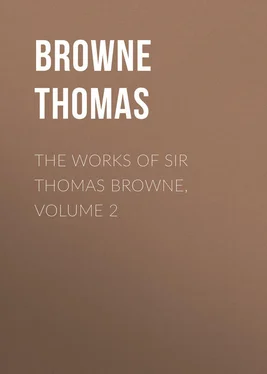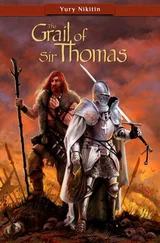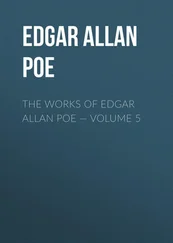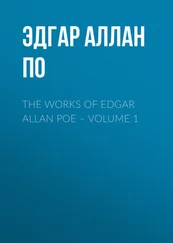Thomas Browne - The Works of Sir Thomas Browne, Volume 2
Здесь есть возможность читать онлайн «Thomas Browne - The Works of Sir Thomas Browne, Volume 2» — ознакомительный отрывок электронной книги совершенно бесплатно, а после прочтения отрывка купить полную версию. В некоторых случаях можно слушать аудио, скачать через торрент в формате fb2 и присутствует краткое содержание. ISBN: , Жанр: foreign_antique, foreign_prose, на английском языке. Описание произведения, (предисловие) а так же отзывы посетителей доступны на портале библиотеки ЛибКат.
- Название:The Works of Sir Thomas Browne, Volume 2
- Автор:
- Жанр:
- Год:неизвестен
- ISBN:http://www.gutenberg.org/ebooks/39961
- Рейтинг книги:5 / 5. Голосов: 1
-
Избранное:Добавить в избранное
- Отзывы:
-
Ваша оценка:
- 100
- 1
- 2
- 3
- 4
- 5
The Works of Sir Thomas Browne, Volume 2: краткое содержание, описание и аннотация
Предлагаем к чтению аннотацию, описание, краткое содержание или предисловие (зависит от того, что написал сам автор книги «The Works of Sir Thomas Browne, Volume 2»). Если вы не нашли необходимую информацию о книге — напишите в комментариях, мы постараемся отыскать её.
The Works of Sir Thomas Browne, Volume 2 — читать онлайн ознакомительный отрывок
Ниже представлен текст книги, разбитый по страницам. Система сохранения места последней прочитанной страницы, позволяет с удобством читать онлайн бесплатно книгу «The Works of Sir Thomas Browne, Volume 2», без необходимости каждый раз заново искать на чём Вы остановились. Поставьте закладку, и сможете в любой момент перейти на страницу, на которой закончили чтение.
Интервал:
Закладка:
Sixthly, Although we were satisfied we had the Unicorns Horn, yet were it no injury unto reason to question the efficacy thereof, or whether those vertues pretended do properly belong unto it. For what we observe, (and it escaped not the observation of Paulus Jovius many years past) none of the Ancients ascribed any medicinal or antidotal vertue unto the Unicorns Horn; and that which Ælian extolleth, who was the first and only man of the Ancients who spake of the medical vertue of any Unicorn , was the Horn of the Indian Ass; whereof, saith he, the Princes of those parts make bowls and drink therein, as preservatives against Poyson, Convulsions, and the Falling-sickness. Now the description of that Horn is not agreeable unto that we commend; for that (saith he) is red above, white below, and black in the middle; which is very different from ours, or any to be seen amongst us. And thus, though the description of the Unicorn be very ancient, yet was there of old no vertue ascribed unto it; and although this amongst us receive the opinion of the same vertue, yet is it not the same Horn whereunto the Antients ascribed it.
Lastly, Although we allow it an Antidotal efficacy, and such as the Ancients commended, yet are there some vertues ascribed thereto by Moderns not easily to be received; and it hath surely faln out in this, as other magnified medicines, whose operations effectual in some diseases, are presently extended unto all. That some Antidotal quality it may have, we have no reason to deny; for since Elks Hoofs and Horns are magnified for Epilepsies, since not only the bone in the heart, but the Horn of a Deer is Alexipharmacal, and ingredient into the confection of Hyacinth, and the Electuary of Maximilian; we cannot without prejudice except against the efficacy of this. Expulsive of Poisons. But when we affirm it is not only Antidotal to proper venoms, and substances destructive by qualities we cannot express; but that it resisteth also Sublimate, Arsenick, and poysons which kill by second qualities, that is, by corrosion of parts; I doubt we exceed the properties of its nature, and the promises of experiment will not secure the adventure. And therefore in such extremities, whether there be not more probable relief from fat oyly substances, which are the open tyrants over salt and corrosive bodies, then precious and cordial medicines which operate by secret and disputable proprieties; or whether he that swallowed Lime, and drank down Mercury water, did not more reasonably place his cure in milk, butter or oyl, then if he had recurred unto Pearl and Bezoar, common reason at all times, and necessity in the like case would easily determine.
Since therefore there be many Unicorns ; since that whereto we appropriate a Horn is so variously described, that it seemeth either never to have been seen by two persons, or not to have been one animal; Since though they agreed in the description of the animal, yet is not the Horn we extol the same with that of the Ancients; Since what Horns soever they be that pass among us, they are not the Horns of one, but several animals; Since many in common use and high esteem are no Horns at all; Since if there were true Horns, yet might their vertues be questioned; Since though we allowed some vertues, yet were not others to be received; with what security a man may rely on this remedy, the mistress of fools hath already instructed some, and to wisdom (which is never to wise to learn) it is not too late to consider.
CHAPTER XXIV
That all Animals of the Land, are in theirkind in the Sea
That all Animals of the Land, are in their kind in the Sea, although received as a principle, is a tenent very questionable, and will admit of restraint. For some in the Sea are not to be matcht by any enquiry at Land, and hold those shapes which terrestrious forms approach not; as may be observed in the Moon-fish, or Orthragoriscus, the several sorts of Raia’s, Torpedo’s, Oysters, and many more, and some there are in the Land which were never maintained to be in the Sea, as Panthers, Hyæna’s, Camels, Sheep, Molls, and others, which carry no name in Icthyology History of fishes. , nor are to be found in the exact descriptions of Rondoletius , Gesner , or Aldrovandus .
Again, Though many there be which make out their nominations, as the Hedg-hog, Sea-serpents and others; yet are there also very many that bear the name of animals at Land, which hold no resemblance in corporal configuration; in which account we compute Vulpecula , Canis , Rana , Passer , Cuculus , Asellus , Turdus , Lepus , etc. Wherein while some are called the Fox, the Dog, the Sparrow or Frog-fish: and are known by common names with those at Land; yet as their describers attest, they receive not these appellations from a total similitude in figure, but any concurrence in common accidents, in colour, condition or single conformation. As for Sea-horses which much confirm this assertion; in their common descriptions, they are but Crotesco deliniations which fill up empty spaces in Maps, and meer pictorial inventions, not any Physical shapes: sutable unto those which (as Pliny delivereth) Praxiteles long ago set out in the Temple of Domitius . For that which is commonly called a Sea-horse, is properly called a Morse, and makes not out that shape. That which the Ancients named Hippocampus is a little animal about six inches long, and not preferred beyond the classis of Insects. That which they termed Hippopotamus an amphibious animal, about the River Nile , so little resembleth an horse, that as Mathiolus observeth, in all except the feet, it better makes out a swine. That which they termed a Lion, was but a kind of Lobster: that which they called the Bear, was but one kind of Crab: and that which they named Bos marinus , was not as we conceive a fish resembling an Ox, but a Skait or Thornback, so named from its bigness, expressed by the Greek word Bous , which is a prefix of augmentation to many words in that language.
And therefore although it be not denied that some in the water do carry a justifiable resemblance to some at Land, yet are the major part which bear their names unlike; nor do they otherwise resemble the creatures on earth, then they on earth the constellations which pass under animal names in heaven: nor the Dog fish at Sea much more make out the Dog of the Land, then that his cognominal or name-sake in the heavens. Now if from a similitude in some, it be reasonable to infer a correspondence in all, we may draw this analogy of animals upon plants; for vegetables there are which carry a near and allowable similitude unto animals. Fab. column. de stirp. rarioribus, Orchis, Cercopithecophora, Anthropophora. We might also conclude that animal shapes were generally made out in minerals: for several stones there are that bear their names in relation to animals or their parts, as Lapis anguinus , Conchites , Echinites , Encephalites, Ægopthalmus , and many more; as will appear in the Writers of Minerals, and especially in Bœtius and Aldrovandus .
Moreover if we concede, that the animals of one Element, might bear the names of those in the other, yet in strict reason the watery productions should have the prenomination: and they of the land rather derive their names, then nominate those of the Sea. For the watery plantations were first existent, and as they enjoyed a priority in form, had also in nature precedent denominations: but falling not under that Nomenclature of Adam , which unto terrestrious animals assigned a name appropriate unto their natures: from succeeding spectators they received arbitrary appellations: and were respectively denominated unto creatures known at Land; who in themselves had independent names and not to be called after them, which were created before them.
Читать дальшеИнтервал:
Закладка:
Похожие книги на «The Works of Sir Thomas Browne, Volume 2»
Представляем Вашему вниманию похожие книги на «The Works of Sir Thomas Browne, Volume 2» списком для выбора. Мы отобрали схожую по названию и смыслу литературу в надежде предоставить читателям больше вариантов отыскать новые, интересные, ещё непрочитанные произведения.
Обсуждение, отзывы о книге «The Works of Sir Thomas Browne, Volume 2» и просто собственные мнения читателей. Оставьте ваши комментарии, напишите, что Вы думаете о произведении, его смысле или главных героях. Укажите что конкретно понравилось, а что нет, и почему Вы так считаете.












